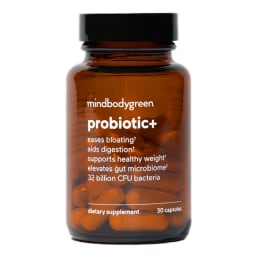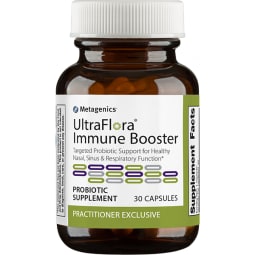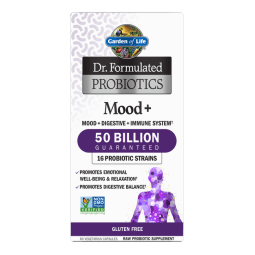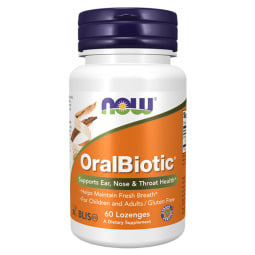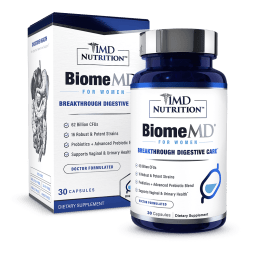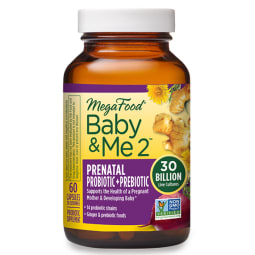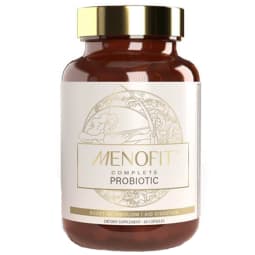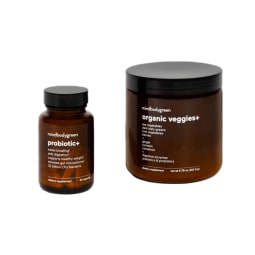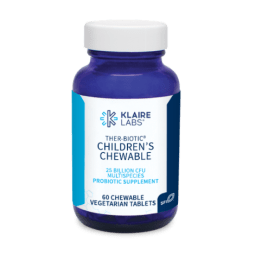Advertisement
The 9 Best Probiotic Supplements Of 2024, According To A PhD


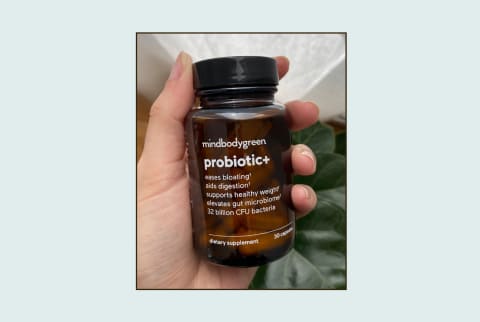
A quick look at the best probiotic supplements of 2024
At this point, the word "probiotic" is as much in the wellness zeitgeist as "organic" or "omega-3s".
You're probably well aware that these beneficial bugs are crucial for your gut health, and you may even be familiar with the wide array of probiotic foods (kombucha, kimchi, and yogurt, to name a few!) that help nourish your gut microbiome.* And while a diet rich in these foods is certainly important for maintaining a healthy gut, sometimes our body needs a little extra support in the form of probiotic supplements.*
Now, that's where things get a little more complicated. Here's the thing: Not all probiotic supplements are created equal.
And since there are so many probiotic supplements out there to choose from, I tapped mindbodygreen's VP of scientific affairs Ashley Jordan Ferira, Ph.D., RDN, and a few other experts, to help cut through the noise.
What are probiotics?
Probiotics are beneficial bacteria that can improve microbial balance and help support gut health.*
In other words, these are live organisms that, when administered in adequate amounts (like in a supplement capsule filled with tens of billions of live bacteria) can bring health benefits to the host (us).*
One of the most common, straightforward ways to incorporate more of these good bugs is through a high-quality probiotic supplement.
How we chose the best probiotic supplements
High-quality ingredients
We vetted and curated probiotic formulas that include meaningful levels of high-quality, clinically-studied strains that are designed to support targeted health areas and overall well-being.
Clean formulas
We carefully critiqued and curated supplements with premium active ingredients and the fewest number of "other ingredients" since less is more on that front.
Delivery format
While vegan capsules provide the most comprehensive and clean probiotics formulas, we also provide diverse delivery format options for your personal preferences—from tablets to powders, to lozenges.
Quality testing
We selected products from brands that prioritize analytical quality testing to ensure the purity and potency of each product in their portfolio.
mbg's picks for the best probiotic supplements of 2024
Pros
- Helps aid digestion and ease bloat*
- Supports healthy weight*
- Contains 4 targeted, clinically studied strains
- Sustainable packaging
Cons
- Daily regimen to maximize benefits
Dietary:
Gluten-freeDairy-freeSoy-freeVeganNon-GMOForm:
CapsuleServing size:
1 capsule dailyCFU count:
32 billionAt mindbodygreen, we have very particular criteria when it comes to high-quality supplements—so when we developed our own probiotic, we made sure it checked all the boxes. mindbodygreen probiotic+ features a unique combination of four clinically-tested strains, which help ease bloating, aid digestion, and holistically support your gut microbiome.*
Plus, save money when you sign up for a mindbodygreen probiotic+ subscription ($69/month), or buy once for $80. New customers save 10% on their first order with promo code MBG10.
What our reviewers say:
"It's a small daily habit that even when the world feels uncertain, I know is making my body, and my life, run a whole lot smoother."* — Kendall King
Read Kendall's full review here.
Pros
- Supports nasal, sinus, and respiratory health*
- Strain-level info provided
- Sustainable packaging
Cons
- Not suitable for vegans
- Starch excipient
Dietary:
Gluten-freeNon-GMOVegetarianForm:
CapsuleServing size:
1 capsule dailyCFU count:
1 billionDon't forget that 70% of your immune system lives in your gut. This probiotic supplement, in particular, features a duo of Lactobacillus strains meant to help support healthy nasal, sinus, and respiratory function.*
Advertisement
Pros
- Supports digestive balance*
- Promotes emotional well-being*
- Unique blueberry blend
Cons
- Not suitable for vegans
- Probiotic strain info lacking for most strains
Dietary:
Gluten-freeNon-GMOVegetarianForm:
CapsuleServing size:
2 capsules dailyCFU count:
50 billionYes, your gut health can have an influence on your mood, too. This supplement specifically contains clinically studied L. helveticus R0052 and B. longum R0175, demonstrated to support emotional well-being. What's more, it contains adaptogenic ashwagandha, which aids with stress management.*
Pros
- Supports oral microbiome*
- Unique delivery format
Cons
- Contains milk
- Not suitable for vegans
- Long list of other ingredients
Dietary:
Gluten-freeSoy-freeNut-freeForm:
LozengesServing size:
2 lozenges dailyCFU count:
1 billionThat's right, your mouth has a microbiome, too (check out our guide to the oral microbiome to find out more). This probiotic supplement features Streptococcus salivarius K12, a strain shown to help the body's natural defenses starting with the mouth.*
Advertisement
Pros
- Formulated for women
- Helps maintain vaginal yeast balance & urogenital tract health*
Cons
- Probiotic blend lacks strain information
- Not suitable for vegans
Dietary:
Dairy-freeNon-GMONut-freeWheat-freeShellfish-freeForm:
CapsuleServing size:
1 capsule dailyCFU count:
62 billionFor a probiotic that supports vaginal health and overall feminine care, look no further. This formula features clinically studied probiotic strains relevant to the urogenital tract that support vaginal and urinary health.*
Pros
- Supports the health of moms-to-be & developing baby*
- Strain level transparency
Cons
- Has to be refrigerated or frozen
Dietary:
Gluten-freeVeganNon-GMOForm:
CapsuleServing size:
2 capsules dailyCFU count:
30 billionPrenatal supplements are so helpful for nourishing mom and baby—and we love that this option features both probiotics and prebiotics. It contains an array of strains including Lactobacillus rhamnosus HN001, which studies suggest may help support baby's developing immune system, particularly during the last trimester & early breastfeeding.*
Advertisement
Pros
- Supports hormone balance*
- Helps ease hot flashes*
- Supports gut health*
Cons
- Lack of probiotic strain info
Dietary:
Gluten-freeDairy-freeSoy-freeVeganMSG-freeForm:
CapsuleServing size:
2 capsules dailyCFU count:
25 billionAnother important stage of life to consider, women in perimenopause and menopause could benefit from a targeted probiotic supplement. This one in particular has a blend of 28 ingredients—probiotics, herbal botanicals (astaxanthin), vitamins (C, D3, K2, riboflavin, B6, folate, B12), and minerals. Consider this a probiotic plus multi-nutrient complex with ingredients to support what's happening in the body during this time.*
Pros
- Combination of pre- and probiotics (synbiotic)
- Helps populate your gut microbiome with good bacteria*
- Helps optimize digestive health*
- Sustainable amber glass packaging
Cons
- Daily regimen to maximize benefits
Dietary:
Gluten-freeDairy-freeSoy-freeVeganNon-GMOForm:
CapsulePowderServing size:
1 capsule daily1 tbsp dailyCFU count:
32 billionIn order to support a healthy gut microbiome, it's important to include both probiotics and prebiotics (which feed the good probiotic bacteria) in your diet and lifestyle. One fantastic way to check both boxes? The mindbodygreen gut health bundle+, which includes probiotic+ along with our organic veggies+ greens powder. In addition to a wide array of powerhouse organic fruits and veggies, this superfood powder contains prebiotic fiber from inulin and flax.*
Advertisement
Pros
- Supports GI and immune health*
- Kid-friendly chewable format
Cons
- Contains sugar alcohol (xylitol)
- Long list of “other ingredients”
- Requires refrigeration
Dietary:
Gluten-freeDairy-freeSoy-freeNut-freeForm:
Chewable tabletServing size:
1 tablet dailyCFU count:
25 billionNourish your kiddos' gut with these easy-to-take chewables. They contain eight different Lactobacillus and Bifidobacterium species (although we'd really like to know the strain info too), which research suggests may help support gastrointestinal health and immune function in children.*
What are CFUs?
Benefits of taking a probiotic
Probiotic bacteria are involved in a wide range of functions from aiding in digestion and absorption to priming the immune system11 and producing neurotransmitters.*
When you take a probiotic supplement, you add more of these good bugs to your gut.*
Here's a closer look at how probiotics can affect your health:
- They're good for your gut.* Probiotics might be best known for their impact on gut health.* "Think of probiotics as your little helpers that restore order and help maintain harmony in your gut ecosystem,"* says gut health expert Vincent Pedre, M.D. "They outnumber and antagonize unwelcomed bugs, including unfavorable bacteria, yeast, and parasites."* Research has shown that probiotics are beneficial for improving gut issues like irregularity (going too much or too little) due to gut imbalance.* A common culprit of gut microbial imbalance is antibiotics. Probiotics are a targeted strategy to elevate the gut microbiome.* Science demonstrates their ability to support numerous functions of the upper and lower GI tract, including abdominal comfort by helping reduce gas and bloating.*
- They can help support a healthy weight.* These good bugs might play a positive role in weight maintenance too.* A recent study2 found that probiotics can aid in significant weight loss in overweight populations.* Another study3 also found that participants who supplemented with a probiotic for six months saw significant weight loss compared to the placebo group.* Additionally, gut bacteria play an important role in metabolism4, involved in everything from digestion to energy production and storage and even appetite regulation. Several studies have shown5 that the gut microbiomes of individuals with obesity are different from the microbiomes of lean individuals. And the reason for that might have to do with how microbes help us break down food. "Certain bacteria are better at extracting energy from food than others," says Rountree. "It's that simple." So, if you happen to have more of these desirable bacterial strains in your gut, then you could eat the same food as a friend and you end up turning it into energy, while your friend turns it into fat.* One of life's most frustrating conundrums, explained.
- They support healthy digestion.* The friendly bacteria in your gut are key players in the breakdown and digestion of fiber-rich carbohydrates (sometimes called prebiotics).* During the breakdown process, gut bacteria produce short-chain fatty acids (SCFAs), like butyrate, which serve as fuel6 for the cells that line and strengthen the barrier of the intestine. As gastroenterologist Will Bulsiewicz, M.D., MSCI, explains, "SCFAs are a real game-changer with the potential to legitimately transform the health of those who pursue it." And a healthy butyrate level, a type of SCFA, is believed to promote good health and a healthy weight—perhaps by helping to support the body's inflammatory response7.*
- They have skin benefits.* Probiotics don't just work wonders inside your body; they can actually affect the outside as well.* "You have bacteria on your skin and all over your body. Probiotics on the skin affect the microbiome that's present on your skin, as opposed to the one in your gut," says integrative medicine expert Amy Shah, M.D. In this case, both oral and topical probiotics can help,* but are certainly not one and the same. (In fact, mbg's Izzy Mattoon discovered the benefit of probiotics for skin, first-hand.*)
- They're heart-healthy.* Believe it or not, the benefits of probiotics can even extend to your ticker.* Case in point: A review8 of more than 30 randomized clinical trials found that taking probiotic supplements can significantly and positively affect total cholesterol levels.* There are also benefits to blood pressure. Consuming probiotics can have positive effects on both systolic (the top number) and diastolic (the bottom number) blood pressure about the same as from eating a low-salt diet, a recent analysis determined.*
- They can help get you going.* Probiotics have been shown to help alleviate symptoms of constipation, too.* A 2022 study found that participants who were given an oral form of probiotics saw a significant improvement in common symptoms of constipation including bowel movements and stool quality.* Another recent study9 found that older individuals with functional constipation who supplemented with probiotics saw an increase in stool frequency compared with a placebo group.* Probiotics have also been shown to aid in relieving diarrhea.* A recent analysis10 found that children with acute diarrhea who were given probiotics had a shorter duration of diarrhea.* It's important to note, however, that study results vary, and further research may be needed to determine the appropriate dosages and forms of probiotics.
How to choose the best probiotic supplement
Here, Ferira shares her tried-and-true factors to consider when seeking an A+ probiotic supplement:
- Strain-level specificity: When it comes to your probiotic, the individual strains and their collective totality are what it's all about. Without the parts, there is no whole. A premium probiotic will be formulated in a way that considers the clinical science backing each strain, (i.e., which strain, at what dose, does the research suggest is useful for each health support area?).Turn over your probiotic and read the Supplement Facts panel. Do you see three pieces of info per probiotic: genus, strain, and species? Many products will only list the first two (genus and species). Ferira explains that listing only a strain without its species is like saying you live on planet Earth without mentioning which country or state you live in. That information is essential to ensure the probiotic is meeting your specific needs and goals. (For information on strains that are particularly beneficial for men, check out our probiotics for men roundup.)
- Dose & clinical evidence: Although there are no recommended daily values for probiotics, supplements should include doses of each strain based on the published scientific evidence from clinical studies. For example, since clinical research11 has shown that a dose of 1.5 billion CFU of the strain Bifidobacterium lactis HN019 supports digestion and regularity, while reducing gas (translation: less bloat). So a gut health probiotic that features B. lactis HN019 should include at least 1.5 billion CFU, the clinically efficacious dose.*Unfortunately, companies will often cut costs by including lower doses. This practice, called dusting, is common in the probiotic supplement world, and something to watch out for.Another way certain products will skirt sharing the doses of each strain is by using "proprietary blends" with a total CFU count. If that's the case, we recommend you ask the company how many CFU of each strain are present in that blend and what studies back each strain.
- Robust quality: We recommend probiotics from reputable brands that care about the quality of their supplements, from raw materials to the finished product. Whether or not a probiotic is shelf-stable or requires refrigeration is not a matter of quality. However, it is important to follow those usage recommendations, as those conditions indicate how the probiotic is designed to be utilized and how it will remain stable over time.
- Other ingredients: We look for supplements with a short list of "others." In other words, less unnecessary or synthetic fillers, dyes, flavors, sweeteners, etc. If the probiotic features other complementary active ingredients (e.g., prebiotic fiber or herbal extracts), they should be science-backed and also include effective levels.Vegan capsules are some of the cleanest delivery formats for a probiotic, while gummies will have the longest list of ingredients (plus sugar).
What to avoid in a probiotic supplement
- Missing strain(s): No strain listed on label or strains with limited scientific support.
- Dusting: Clinically irrelevant levels of probiotic strains.
- Gummies: While gummies can be useful for delivering certain types of vitamins, minerals, and other actives, probiotics are much more efficiently and cleanly consumed (i.e., live strains in potent CFU doses) in capsules, softgels, tablets, and powders.
- Less-than-savory "others": Processed ingredients, artificial sweeteners, synthetic flavors and colors.
- Iffy claims: Irresponsible or bogus claims not rooted in science (again, per probiotic strain).
Frequently Asked Questions
What is the most effective probiotic supplement?
When choosing a probiotic supplement, look for specific info on the genus, species, and strain (those three pieces of information are your probiotic identifiers), clinically-efficacious doses rooted in published science, high-quality ingredients, and a short list of “other ingredients.”
What are the signs you need probiotics?
Supporting the gut microbiome is a good idea for just about anyone. Because most people don’t eat perfectly all the time (fermented foods, prebiotic fiber, fruits, and vegetables, etc.), many experts will recommend a probiotic supplement for your overall health. With that said, other signs you might benefit from a targeted probiotic include (but are not limited to) issues with bloat, gas, regularity, immunity, urogenital tract health, and more.
What foods contain probiotics?
Probiotic-rich foods include certain cheeses, kefir, kimchi, kombucha, miso, pickles, sauerkraut, yogurt, tempeh, and buttermilk. In addition to fermented foods, it’s important to nourish your gut bacteria with fiber-rich, prebiotic foods, too.
What do probiotics do for women?
Women can enjoy all the general and targeted benefits of probiotics, including gut support, bloat ease, and digestion aid. Women tend to be affected by digestive issues more than men. Additionally, probiotics can have a beneficial impact on the urogenital tract due to the presence of the vaginal microbiome.* Read up on the best probiotics for women here and the best probiotics for women over 50 here.
Can probiotics make you poop or cause loose stools?
Supporting upper and lower GI tract functions, probiotics help support many dimensions of healthy digestion, which includes improving regularity to achieve healthy bowel movements.* Probiotics are considered safe to take and won't cause major negative side effects if you're healthy, but as the body adjusts to the new bacteria, some people may experience some short-term, mildly unpleasant changes before seeing improvements (i.e. gas, bloating, changes in bowel movement frequency, headaches).
How long does it take for a probiotic to work?
There's no one-size-fits-all answer to how long it takes for probiotics to work, because those beneficial effects are strain specific. However, in most cases, you can expect to experience results within three weeks, with additional benefits after regular use beyond three weeks.
Are probiotics useful to help replenish good gut bacteria?
Definitely, it can be helpful to take a probiotic supplement to aid in replenishing the good bacteria in your gut and whole-body microbiome.*
How do I know which probiotic is best for me?
Experts recommend taking a general, diverse probiotic with Lactobacillus and Bifidobacterium strains for anyone new to probiotics. These two genera of probiotics are the most widely researched to date. Specific probiotic strains have specific benefits, so it’s worth looking into their impact and science backing before choosing a supplement. Targeted probiotics should include strains with benefits specific to those health areas.*
The takeaway
Consuming probiotic supplements can help support good bacteria in the gut and can be greatly beneficial for overall health.*
Look for ones that contain ingredients at effective doses that have been researched in humans for gut health, are low in "other ingredients," and come from a trusted brand (cue the 9 above!).
And as always, talk to your doctor before incorporating any new supplement into your routine.
Meet The Experts
11 Sources
- https://www.sciencedirect.com/science/article/pii/S2452231718300095
- https://www.ncbi.nlm.nih.gov/pmc/articles/PMC8540110/
- https://www.nature.com/articles/s41598-020-60991-7
- https://www.ncbi.nlm.nih.gov/pmc/articles/PMC5127273/
- https://www.ncbi.nlm.nih.gov/pmc/articles/PMC6266556/
- https://www.frontiersin.org/articles/10.3389/fimmu.2019.00277/full
- https://www.ncbi.nlm.nih.gov/pmc/articles/PMC4275385/
- https://www.ncbi.nlm.nih.gov/pmc/articles/PMC5805418/
- https://www.nature.com/articles/s41430-022-01189-0
- https://www.ncbi.nlm.nih.gov/pmc/articles/PMC8753473/#:~:text=The%20utility%20of%20single%20probiotics,%2C%20fever%2C%20and%20other%20symptoms.
- https://www.ncbi.nlm.nih.gov/labs/pmc/articles/PMC3171707/
